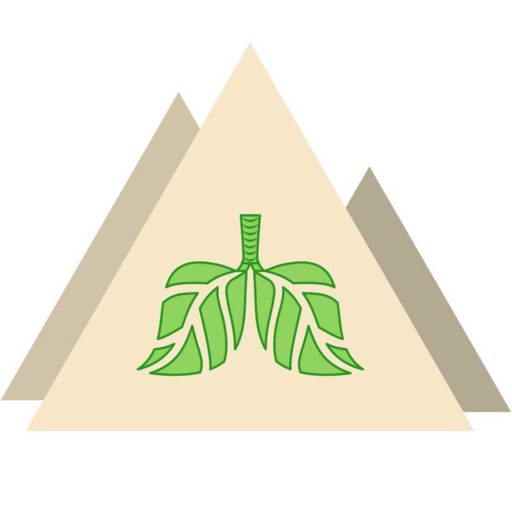Conditions which may benefit from Salt Therapy
Further Information plus list of contraindicationsAsthma
Asthma is a disease of inflamed and irritated airways. The dry aerosol salt, aided by negative ions of the salt room environment, has the therapeutic effect of reducing inflammation throughout the entire respiratory system, from the larger bronchioles deep down into the alveoli of the lung tissue.
Mucociliary clearance is self-evident often after only a few sessions and often becomes evident some 24 hours after a session.
Most asthmatics take a reliever inhaler (e.g Ventolin, salbutamol) and a preventer steroid inhaler (e.g. fostair, ). In some cases, these inhalers can be seen by the body as pathogens (foreign matter) and other side effects such as oral thrush, hoarse voice can be experienced.
The anecdotal evidence of very many Asthmatics seeing very significant health improvements from salt cave use are indisputable. Patients are strongly advised to maintain their medication regime until salt therapy benefits seem evident then discuss the matter with their doctor.
Bronchitis and Chronic Bronchitis
Heavy phlegm, laboured breathing and at times a heavy cough are all characteristic of Bronchitis. Often this is brought on by colds, chest infections, and regular tobacco smoking. The combined benefits of salt therapy being anti-inflammatory, sterilisation and mucociliary action seem to produce highly impressive results after a series of sessions.
Chest Infections
In the normal healthy lung there are no resident bacteria, those bacteria entering at times are collected by the thin layer of mucus regularly being expelled by the cilia in the lungs alveoli. In weak lungs, heavy with retained old mucus bacteria happily embed themselves into that mucus as a warm wet fertile source of food! Eventually infection sets in and then the big do or don’t use antibiotics debate kicks in.
Halotherapy is ideal for killing bacteria and lifting mucus but our advice is if you are going to use salt therapy get there at the earliest opportunity.
Whether you use salt cave therapy or not, drink as much as possible to help thin the mucus. If you do get an antibiotic then consider discussing with your Doctor – Amoxicillin ( e.g. Augmentin) as it kills both aerobic and anaerobic strains of bacteria. It CONTAINS PENICILLIN, NOT SUITABLE IF ALLERGIC TO PENICILLIN.
COPD (Chronic Obstructive Pulmonary Disease)
Often caused by a history of smoking, however many salt therapy patients worldwide report very significant improvement of symptoms. It is thought that the halotherapy process helps lift tar and mucus off the cilia of the lung, has a bactericidal effect cleansing the microbial flora of the respiratory tract, and reduces IgE levels making tissue less sensitive to allergens and pathogens.
Anecdotes from Salt Rooms and Caves throughout the world attest to the remarkable relief that can be achieved for COPD sufferers.
Emphysema is a form of COPD whereby the Alveoli of the lungs are enlarging and bursting making oxygen and carbon dioxide exchange very difficult resulting in patients struggling to expel carbon dioxide. This is a disease which can commonly degenerate quite quickly resulting in a very poor outcome. Such patients throughout the world speak well of the benefits that salt cave therapy has brought to them.
With all forms of COPD, quitting smoking has to happen if you are serious about longevity. The bad news is that research is now saying that ‘Vaping’ can be responsible for encouraging bacteria into the lungs and Vap users should consider having Pneumonia jabs. However Vaping must still be preferable to smoking for COPD sufferers that just can’t kick the addiction.
Sinusitis, Rhinitis, Snoring and Nasal Polyps
All of the above fall into the category of inflamed nasal and sinus areas causing a restriction in breathing and often a related build up of mucus. The anti-allergic and anti-inflammatory effect of dry aerosol salt and Himalayan salt environment seem to achieve in most patients a reasonably rapid improvement of symptoms – not unlike a few bracing days at the seaside!
Nasal polyps are new tissue growing on the mucus membrane of the nasal linings. Salt cave therapy has shown good results in shrinkage of the polyps to a less inflamed state.
2-5 sessions of salt therapy regularly show significant improvement.
Croup
Often prevalent in children, Croup is a difficulty in breathing due to swelling of the vocal chords and inflammation of the upper airways. The anti-bacterial and anti-inflammatory effects of aerosol salt have been shown to produce meaningful relief.
Ear Infections
There are many reports from patients worldwide of Salt Therapy helping in the case of ear infections. As swelling of the auditory tubes reduces in the process, drainage behind the tympanic membrane improves and thereby infection is reduced.
Cystic Fibrosis
This is an inherited condition whereby failure in the chemistry of the lungs cells causes a build-up of thick stick mucus. Patients are forever susceptible to chest infections and breathing difficulty. The condition is both genetic and progressive in that deterioration is inevitable. Cystic Fibrosis patients undergoing salt cave therapy treatment have in many cases found great relief of symptoms but it can never be an actual cure. Patients with Cystic Fibrosis must make the condition known to our reception staff prior to a session.
Stress
Do ONE session…..you decide!
Contraindications for Salt Therapy
This treatment is not recommended for patients suffering from any of the symptoms below:
• Acute stage of respiratory attack
• Stage 3 Chronic Obstructive Pulmonary Disease
• Intoxication due to alcohol or non-prescription drugs
• Cardiac insufficiency
• Haemorrhage
• Haemoptysis (spitting up blood)
• Stage 11B Hypertension
Acute Stage of Disease
• Sever chronic Respiratory failure
• Chronic obstructive lung disease with 3rd of chronic lung Insufficiency
• Intoxication
• Cardiac Insufficiency
• Bleeding
• Spitting of Blood
• Hypertension in HB stage (160/100mmHg+)
• Hypotension (90/60mmHg or lower)
• Any form and stages of Tuberculosis
• Claustrophobia
• Chronic Kidney Disease
• All Internal Disease in Decompensation
• Hyperthyroidism
